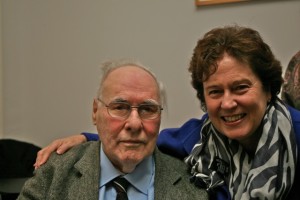
By Sarah Mac Donald - 03 November, 2017

Theologian Fr Gabriel Daly OSA with his fellow theologian Dr Gina Menzies. Pic courtesy: Colm Holmes.
Augustinian theologian, Fr Gabriel Daly, has urged the Catholic faithful to visit a Protestant or Anglican church and take part in a service to mark the 500th anniversary of the Reformation.
In a recent homily, Dr Daly, a retired lecturer at Trinity College Dublin, told his congregation that it was just fifty years ago that the Catholic Church had permitted the faithful to visit other Churches.
“Let’s remember those 450 years that were filled with enmity, lack of understanding and unconcern for the unity which Christ wished for his one church. Let’s remember all our brothers and sisters in Christ, Protestant and Catholic, instead of focusing on our own church exclusively,” he urged.
Recalling events 500 years ago, he said the Church “badly needed to be reformed”, and that Augustinian Martin Luther “did us all a favour in having the courage to risk his life in the profession of Christian values”.
“He looked at the Church around him and saw that it was full of superstitions like the buying and selling of indulgences, cheap ways of getting into heaven – the exact opposite of his new convictions.”
Only the protection of some of the German princes saved him from serious punishment, including death, by the Holy Roman Emperor, Charles V. He was excommunicated by Pope Leo X, who, Fr Daly said, was a renaissance prince rather than a spiritual leader.
Acknowledging that he is sometimes accused of being a Protestant, the 90-year-old theologian said the same thing was said about the reformers at Vatican II. “So I’m in good company.”
He said the Church was divided as a result of the Reformation, but “great progress is being made in ecumenical dialogue to bring us together again”.
“There have to be changes if unity is to come. We have much to learn from each other. The days when the Catholic Church thought it had all the answers and all Christian truth are long gone. All Christians, Protestant and Catholic, are totally dependent on the action of the Holy Spirit.”
Five hundred years ago the move to reform the Church resulted in a tragic division of Christians which lasted until the early 20th century, when some Protestant missionaries pointed out that their divisions were damaging the message they were trying to bring to the people they were evangelising, the theologian noted.
This realisation led to the beginning of the movement for Christian unity.
Catholics were forbidden to join the movement until the reforms of the Second Vatican Council made it possible to join Protestants in the quest for Christian unity.
“That quest is very recent and it is up to us to give it our caring support,” Dr Daly said.